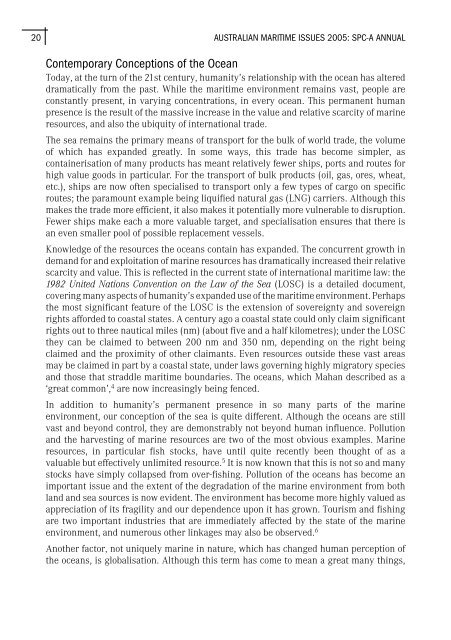Australian Maritime Issues 2005 - Royal Australian Navy
Australian Maritime Issues 2005 - Royal Australian Navy
Australian Maritime Issues 2005 - Royal Australian Navy
Create successful ePaper yourself
Turn your PDF publications into a flip-book with our unique Google optimized e-Paper software.
20<br />
AUSTRALIAN MARITIME ISSUES <strong>2005</strong>: SPC-A ANNUAL<br />
Contemporary Conceptions of the Ocean<br />
Today, at the turn of the 21st century, humanity’s relationship with the ocean has altered<br />
dramatically from the past. While the maritime environment remains vast, people are<br />
constantly present, in varying concentrations, in every ocean. This permanent human<br />
presence is the result of the massive increase in the value and relative scarcity of marine<br />
resources, and also the ubiquity of international trade.<br />
The sea remains the primary means of transport for the bulk of world trade, the volume<br />
of which has expanded greatly. In some ways, this trade has become simpler, as<br />
containerisation of many products has meant relatively fewer ships, ports and routes for<br />
high value goods in particular. For the transport of bulk products (oil, gas, ores, wheat,<br />
etc.), ships are now often specialised to transport only a few types of cargo on specific<br />
routes; the paramount example being liquified natural gas (LNG) carriers. Although this<br />
makes the trade more efficient, it also makes it potentially more vulnerable to disruption.<br />
Fewer ships make each a more valuable target, and specialisation ensures that there is<br />
an even smaller pool of possible replacement vessels.<br />
Knowledge of the resources the oceans contain has expanded. The concurrent growth in<br />
demand for and exploitation of marine resources has dramatically increased their relative<br />
scarcity and value. This is reflected in the current state of international maritime law: the<br />
1982 United Nations Convention on the Law of the Sea (LOSC) is a detailed document,<br />
covering many aspects of humanity’s expanded use of the maritime environment. Perhaps<br />
the most significant feature of the LOSC is the extension of sovereignty and sovereign<br />
rights afforded to coastal states. A century ago a coastal state could only claim significant<br />
rights out to three nautical miles (nm) (about five and a half kilometres); under the LOSC<br />
they can be claimed to between 200 nm and 350 nm, depending on the right being<br />
claimed and the proximity of other claimants. Even resources outside these vast areas<br />
may be claimed in part by a coastal state, under laws governing highly migratory species<br />
and those that straddle maritime boundaries. The oceans, which Mahan described as a<br />
‘great common’, 4 are now increasingly being fenced.<br />
In addition to humanity’s permanent presence in so many parts of the marine<br />
environment, our conception of the sea is quite different. Although the oceans are still<br />
vast and beyond control, they are demonstrably not beyond human influence. Pollution<br />
and the harvesting of marine resources are two of the most obvious examples. Marine<br />
resources, in particular fish stocks, have until quite recently been thought of as a<br />
valuable but effectively unlimited resource. 5 It is now known that this is not so and many<br />
stocks have simply collapsed from over-fishing. Pollution of the oceans has become an<br />
important issue and the extent of the degradation of the marine environment from both<br />
land and sea sources is now evident. The environment has become more highly valued as<br />
appreciation of its fragility and our dependence upon it has grown. Tourism and fishing<br />
are two important industries that are immediately affected by the state of the marine<br />
environment, and numerous other linkages may also be observed. 6<br />
Another factor, not uniquely marine in nature, which has changed human perception of<br />
the oceans, is globalisation. Although this term has come to mean a great many things,

















